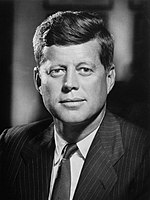| ||||||||||||||||||||||||||
| ||||||||||||||||||||||||||
 County Results
| ||||||||||||||||||||||||||
| ||||||||||||||||||||||||||
| Elections in New Jersey |
|---|
 |
The 1960 United States presidential election in New Jersey took place on November 8, 1960. All 50 states were part of the 1960 United States presidential election. Voters chose 16 electors to the Electoral College, which selected the president and vice president.
New Jersey was won by the Democratic nominees, Senator John F. Kennedy of Massachusetts and his running mate Senate Majority Leader Lyndon B. Johnson of Texas. Kennedy and Johnson defeated the Republican nominees, Vice President Richard Nixon of California and his running mate Ambassador Henry Cabot Lodge Jr. of Massachusetts.
Kennedy carried New Jersey with 49.96% of the vote to Nixon's 49.16%, a margin of 0.80%.[1] Kennedy managed to narrowly win the state despite winning only seven counties to Nixon's 14. However, Kennedy managed to rack up large margins decisively winning some of the most heavily populated counties in the state, while keeping the results very close in those heavily populated counties that he lost. As the first Roman Catholic nominee, from an urban Irish immigrant background, John Kennedy appealed strongly to working-class Catholics and other urban ethnic immigrant groups,[2] who turned out in record numbers to support him. Thus Kennedy's support base was condensed into mostly heavily populated urban areas.
New Jersey in this era was usually a swing state with a slight Republican lean. But in 1960, excitement among the many Catholic and other ethnic immigrant communities that populated New Jersey's cities for the historic candidacy of John F. Kennedy led to record turnout to elect the first Catholic president, thus narrowly delivering the state to Kennedy.[3] The Great Migration also helped Kennedy, who clearly won the state's African-American voters.[4] As Kennedy eked out a razor-thin victory nationally to win the presidency, New Jersey voted basically how the nation voted. But under the unique circumstances that made Kennedy popular in Northeastern states, New Jersey's results in 1960 made it about .18% more Democratic than the national average. This was also the last election until fellow Democratic candidate from Massachusetts John Kerry did so in 2004, when a Northern Democrat won New Jersey, as the next three Democratic presidential candidates to carry the state were all from the South (Lyndon B. Johnson was from Texas, Bill Clinton from Arkansas, and Al Gore from Tennessee), even though New Jersey is a northern state.
- ^ "1960 Presidential General Election Results - New Jersey". Dave Leip’s Atlas of U.S. Presidential Elections. Retrieved November 25, 2013.
- ^ Donaldson, Gary; The First Modern Campaign: Kennedy, Nixon, and the Election of 1960, p. 81 ISBN 0742548007
- ^ Menendez, Albert J.; The Religious Factor in the 1960 Presidential Election: An Analysis of the Kennedy Victory over Anti-Catholic Prejudice, p. 103 ISBN 0786484934
- ^ McAdam, Doug; Political Process and the Development of Black Insurgency, 1930-1970, p. 158 ISBN 0226555534

